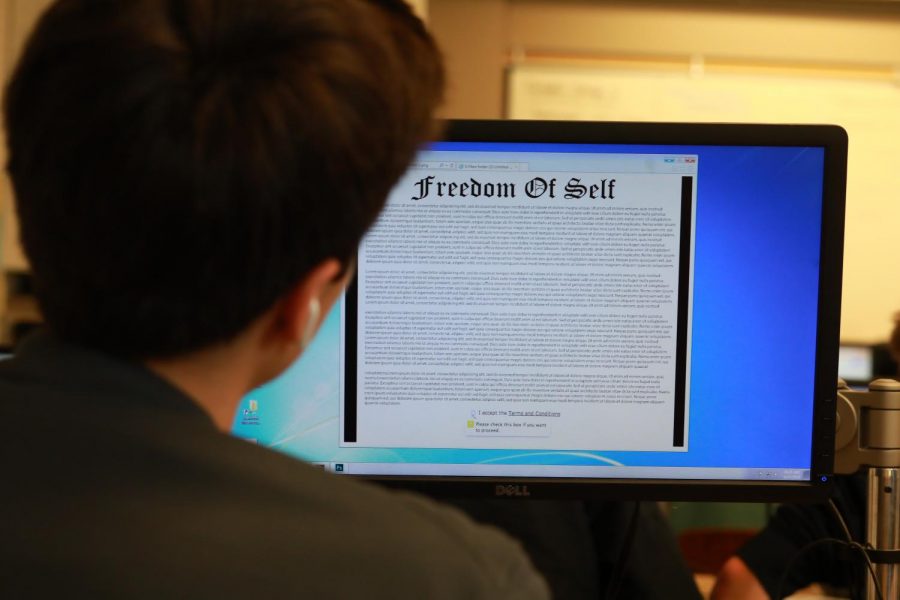Do You Have Ownership of Yourself?
IS YOUR BODY REALLY YOURS? The complicated discussion of ownership can lead to a deeper discussion than the surface reveals.
April 23, 2019
I was listening to an episode of Radiolab last month on the way home from Sammamish. The sun was bright, the sky was blue, and hearing these crisp voices of Jad Abumrad and Robert Krulwich speak about the question of if we legally own our bodies launched me into an obsession over the question. I went mildly manic. I asked every history teacher at Issaquah High, citing the episode in a half-remembered retelling of key points cited by the podcast. I argued with friends and frenziously debated for my point that; yes, of course we own our bodies legally, but is it that simple?
In the simplest form of its being, Merriam Webster defines the word “property’ as “something owned or possessed” and specifically, “the exclusive right to possess, enjoy, and dispose of a thing.” This is the basic view of the word that we as a society have chosen to agree on, but in J.W. Harris’s article, “Who Owns My Body” for the Oxford Journal of Legal Studies, he brings forth a new definition. Harris writes, “We get by in daily life with a range of conventional property talk which has no problems in ‘knowing’ who owns a particular book or car or a house or a ten pound note. Otherwise we could not borrow or lend or sell or use things without consulting other people’s preferences.” Ultimately since we as a collective have decided to not consider our own bodies as a part of the categories of what is “property,” we can securely say we do own our own bodies. The 13th Amendment assists in the furthering of this idea, declaring that, “Neither slavery nor involuntary servitude, except as a punishment for crime whereof the party shall have been duly convicted, shall exist within the United States, or any place subject to their jurisdiction,” meaning that the act of slavery, which is the full ownership of another being or body, is banned in the United States.
We can all take a deep sigh of relief knowing that, for now, you legally do own your own body. But taking a few steps deeper into the question, is it really that simple? Guido Calabresi wrote a speech for Yale university titled, “Do We Own Our Bodies?” In it, Calabresi states, “We do not let people sell their hearts. However, we do let them sell their blood and we let them sell their hair… If people really owned their bodies in the same way that they own property, we would presumably allow people to sell all of their body parts.” And in the article, “Who Owns Your Body” for Psychology Today, Ph. D, J.D. Michael Karson writes, “When your body got going, your mother mainly owned it… Your father might have had some rights or not… The State had some ownership as well, from dictating the extent of your mother’s right to end the pregnancy to determining what she was allowed to eat and drink. You had no ownership at all.” These two quotes brings us to two major topics in the debate of body property and ownership, prostitution and reproduction rights.
On a federal scale, prostitution is illegal and punishable and according to the Inadmissible Aliens law, “Any alien who– (i) is coming to the United States solely, principally, or incidentally to engage in prostitution, or has engaged in prostitution within 10 years of the date of application for a visa, admission, or adjustment of status… is inadmissible.” The only state to legally allow prostitution is in Nevada. These laws are often built to protect and facilitate those involved and trapped in human trafficking. But technically if citizens wholly owned their bodies, would that not make prostitution a perfectly legal source of income? This is not so much to bring the debate of the legality of prostitution in America, but rather to reflect and consider every tangent into this argument. In this debate of whether our bodies are really our own, would consensual sex work be viable? Consent is a complicated case to argue in the legal court, but one that further complicates the debate itself.
Arguments for and against reproductive rights are centered around who owns the body. Is it the pregnated person, the government, the fetus itself? Abortion has taken center stage in recent years and famous court cases like “Roe v. Wade” and “Planned Parenthood of Southeastern Pennsylvania v. Casey,” established standards and boundaries today of who can receive legal abortion and in what manner they are given. These laws both give the federal government an increased control of the body but simultaneously limits it in valuable ways for the reproductive rights movement. However, it still does not stand to answer the question if you have full legal ownership of your body.
I am not sure if we will be able to truly answer this question in full, but ultimately, maybe it is for the better that we do not. If we collectively decide that the body is property and we have full ownership of our own, what range of lawlessness could that lead to. But if the same decision is made, but the government claims ownership instead, what kind of world would that put us in? For now, as we continue to consider our bodies as outside the realm of property, let us all enjoy it, maybe treat ourselves to a milkshake, and think about a better reality rather than a worse one.



